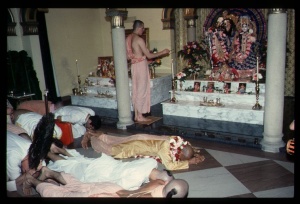CC Adi 17.272

A.C. Bhaktivedanta Swami Prabhupada
TEXT 272
- eta bali’ bhāratī gosāñi kāṭoyāte gelā
- mahāprabhu tāhā yāi’ sannyāsa karilā
SYNONYMS
eta bali’ — saying this; bhāratī — Keśava Bhāratī; gosāñi — the spiritual master; kāṭoyāte — to Katwa; gelā — went; mahāprabhu — Lord Caitanya Mahāprabhu; tahā — there; yai’ — going; sannyāsa — the renounced order of life; karilā — accepted.
TRANSLATION
After saying this, Keśava Bhāratī, the spiritual master, went back to his village, Katwa. Lord Caitanya Mahāprabhu went there and accepted the renounced order of life [sannyāsa].
PURPORT
At the end of His twenty-fourth year, at the end of the fortnight of the waxing moon, Śrī Caitanya Mahāprabhu left Navadvīpa and crossed the river Ganges at a place known as Nidayāra-ghāṭa. Then He reached Kaṇṭaka-nagara, or Kāṭoyā (Katwa), where He accepted ekadaṇḍa-sannyāsa according to the Śaṅkarite system. Since Keśava Bhāratī belonged to the Śaṅkarite sect, he could not initiate Caitanya Mahāprabhu into the Vaiṣṇava sannyāsa order, whose members carry the tridaṇḍa.
Candraśekhara Ācārya assisted in the routine ceremonial work of the Lord’s acceptance of sannyāsa. By the order of Śrī Caitanya Mahāprabhu, kīrtana was performed for the entire day, and at the end of the day the Lord shaved off His hair. On the next day He became a regular sannyāsī, with one rod (ekadaṇḍa). From that day on, His name was Śrī Kṛṣṇa Caitanya. Before that, He was known as Nimāi Paṇḍita. Śrī Caitanya Mahāprabhu, in the sannyāsa order, traveled all over Rāḍhadeśa, the region where the Ganges River cannot be seen. Keśava Bhāratī accompanied Him for some distance.